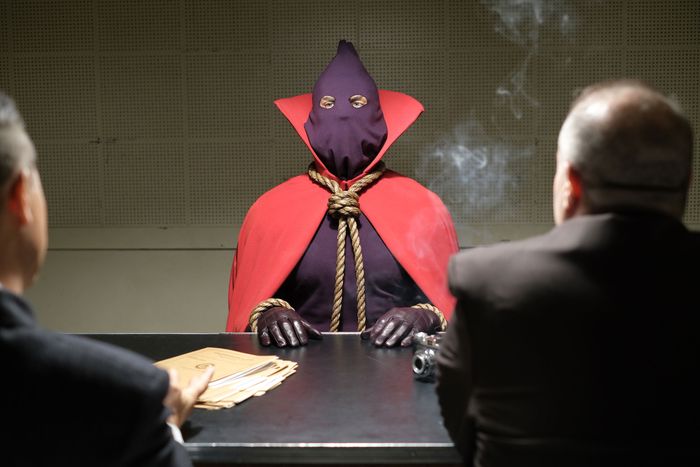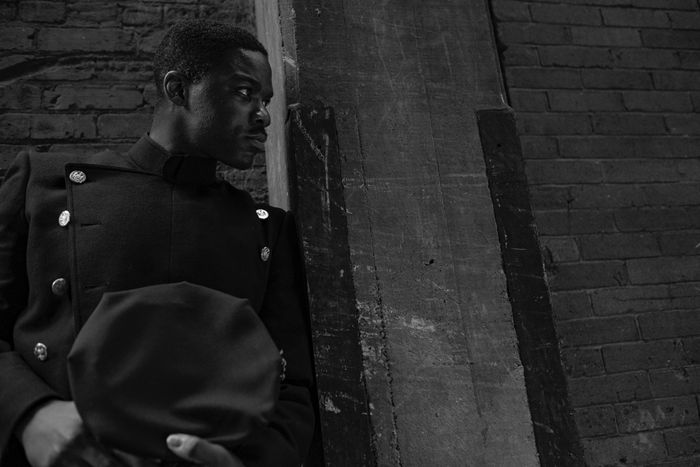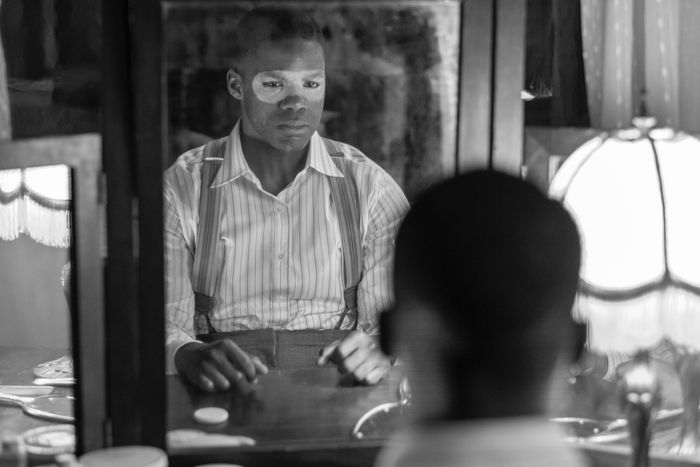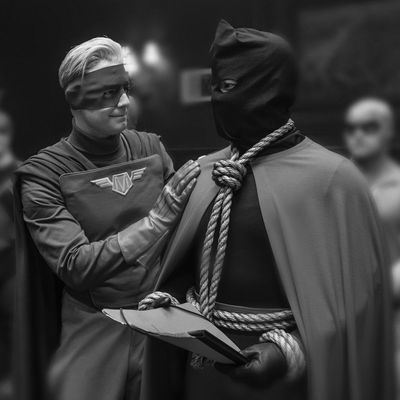
To truly understand the United States of America, you must understand blackness — its rhythms, its splendor, its history. Over the course of Watchmen’s first season, the HBO series has done more than just boldly imagine the dystopian, chaotic world that came after the events of the comic by Alan Moore, Dave Gibbons, and John Higgins. It has made trenchant explorations of the nature of blackness in America, loneliness, PTSD, and generational trauma. Its characters sear themselves in the imagination, especially Angela Abar (played with fearsome intensity by Regina King) and her prickly, mysterious grandfather, Will Reeves (Louis Gossett Jr.).
The show’s most fascinating thread yet concerns Angela, Will, and the origins of Hooded Justice, the superhero who inspired the formation of the Minutemen, a crime-fighting team valorized in an arch show-within-the-show called American Hero Story. In Sunday’s episode, “This Extraordinary Being,” Watchmen evocatively reimagines the nature of superheroics and the original comic itself with the revelation that Will Reeves is Hooded Justice. In making Hooded Justice a black man and using his story to explore the perils of racism, the series strikingly departs from its source material, which had few people of color in its pages at all. Even then, it’s fitting for a comic that poised itself on political exploration and critique.
In many ways, Watchmen has been building toward this revelation all season. “This Extraordinary Being” movingly interweaves various threads that have been sewn into the series thus far, from Will’s childhood awe at Bass Reeves to flashbacks of the 1921 Tulsa Massacre. In the episode, Angela experiences her grandfather’s memories after taking a lethal dosage of the illegal drug Nostalgia: She sees through his eyes what it was like to be a black cop in 1930s and 1940s New York City, only to grow worn down by violent racism and choose to find justice outside of the law he once revered. With fine-tuned grace, the episode explores anti-black violence through a heartwrenching lynching scene, queer identity, and familial legacies of inherited trauma.
I spoke with episode co-writer Cord Jefferson, a former journalist who also writes on another tremendous series, The Good Place, about crafting this complex episode, handling anti-black violence and racism with care, arguments in the Watchmen writers’ room, and the very different lessons he’s learned from Mike Schur and Damon Lindelof.
Let’s start at the beginning. The reveal of Will being Hooded Justice feels like something the show was carefully building toward. When did this idea develop?
From the outset, Damon knew he wanted Hooded Justice to be black. We came into the room, day one, with that knowledge. How he decided to become Hooded Justice and what his relationship was going to be with Angela — all of that stuff came later. But on day one, Damon wanted Hooded Justice to be a black man.
How did the idea evolve from there?
Damon sent us all home with homework one night: What happened to Will in order to make him want to be a vigilante? I came in the next morning with the idea that it was a lynching. There’s no way that I look at a guy with a noose around his neck and not immediately think of lynching in the United States.
My thinking about it was, in the 1930s, who would be seeking justice outside of a courtroom? The most ridiculous superhero is Batman because the idea that a billionaire white guy can’t find justice and so he needs to take to the streets in a bat costume is crazy, right? ’Cause a billionaire white guy can pretty much do what he wants. I was thinking, Who’s the kind of person that would want to be a superhero? Who would want to be a masked vigilante? It made perfect sense that that would be a person of color. So, I came in with the idea that he was lynched by his fellow police officers.
The point-of-view shots in the episode are fascinating. We get a long one when Will is being lynched, and again, later, when he kills the KKK members in the warehouse. Were those shots written into the script?
The point-of-view shot for the lynching was. It’s just an incredibly visceral, difficult moment. To enhance how visceral and difficult and uncomfortable it is, we wanted to see what happens when the hood goes over the head. I was not expecting to be as moved and as pained by that scene as I was, because I had such a hand in it. But that’s the most difficult scene I’ve watched in a long time.
It is a very difficult scene to watch. With regard to writing that point-of-view shot, did you think about the ethics of subjecting or implicating the viewer? It really affected me more emotionally than I thought it would.
We thought very deeply about the ethics of the show. A similar question could be asked of the opening of the pilot, the Tulsa ’21 Massacre. Even as difficult as it is to see these things, we didn’t want to pull any punches. We wanted people to feel uncomfortable because you should feel uncomfortable. But also, we don’t ever want to be flippant with the material and use it just to be shocking. What was important was that we weren’t casually using black trauma for entertainment value. Hopefully, people see that we included those scenes not to be frightening for frightening’s sake, but because we wanted people to understand the awful nature of it and confront it head-on.
An important theme of this season, but particularly an important theme of this episode, is generational trauma. The legacy of trauma and our ancestors can carry on, and it’s trauma that we then hold in our lives and try to hopefully not pass down to the people who come after us. That scene when Angela says, “I’m not angry,” when she takes the place of her grandfather in the bar, we felt was an important scene. Angela is a person who denies a lot of her emotions in order to put on this front. Having that mask slip a little when she says, “I’m not angry” — and Will was saying the same thing just 80 years before — it was an important moment to switch back and forth between the two characters. We felt like Angela and her grandfather were sharing these same wounds.
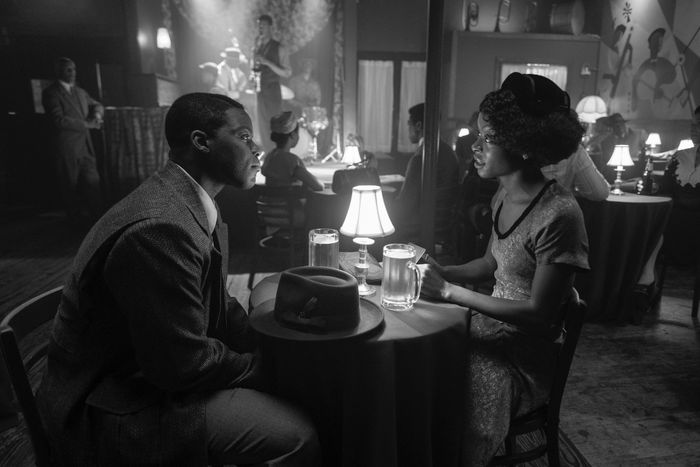
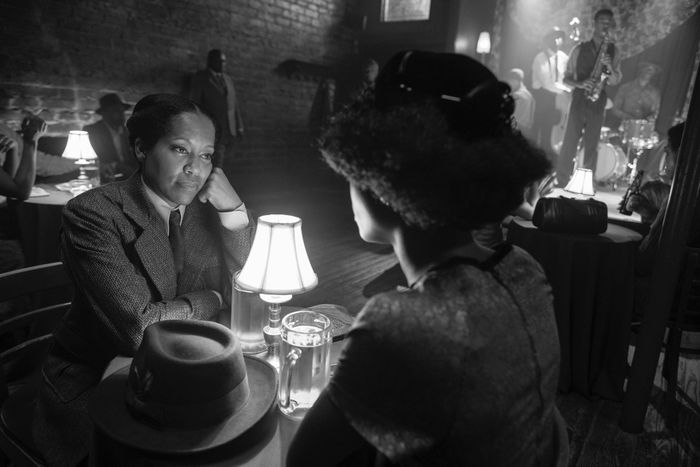
The show’s handling of familial legacies is fascinating, especially from a black American perspective. How can we expect this will affect Angela’s perspective going forward?
Well, I have no idea what happens in episodes eight and nine because I left the show. [Laughs.] I had to leave the show to go work on The Good Place.
Oh!
I decided that I wanted to see it like a viewer, so I do not know what happens at the end. But I will say that episode seven offers Angela a softer perspective of who this man is. Angela’s been terrorized, tricked, and, for lack of a better term, fucked with by this 100-year-old man who has seemingly killed her best friend. She’s trying to piece together why he would do this. And so, when she sees his trauma and understands his life, her perspective on him shifts. If you had an opportunity to live somebody’s worst moments and see that they’d made bad decisions, but understand the origin of those decisions and why they made them, I think that would soften you to anyone.
Damon Lindelof said there were heated debates in the writers’ room. What were the biggest arguments?
The one that immediately leaps to mind is how reparations would be implemented. That was a really big discussion: What would be the technical aspects of implementing reparations in the United States of America? We went back and forth about that for a couple days. Would it be a lump-sum payment? Would it be a cash payout? Or would it instead be a tax-based thing, where people didn’t have to pay federal or state income taxes? We basically became policymakers, like congresspeople trying to figure out how reparations would be implemented in the United States of America.
I also remember that Damon was very wary about using the N-word. We had a debate about that for a while. When I put it in [the lynching scene], he was very, very wary of keeping that in the script. He said, “I know that you’re the one who wrote it down, but I’m not sure I’m allowed to put my name on this and say that I wrote this word.” We discussed it at length and I eventually convinced him. To me, the lynching is like far, far more affecting and shocking and hurtful than the N-word. I said, “Let’s be honest. Let’s not pull punches. This is what these people would say.” But as a white man, he was very, very wary of putting it into anything that bared his name.
What was the racial breakdown of the writers’ room?
There was me, Stacy [Osei-Kuffour] is a black woman, Christal Henry is a black woman. Ryan Lipscomb is the writer’s assistant — he’s black. Branden Jacobs-Jenkins was in the room — he’s black. Janine Nabers was in the room — she’s black.
And then, there were seven white people — Jeff [Jensen], Lila [Byock], Carly [Wray], Nick [Cuse], Damon, Claire [Kiechel], and Tom [Spezialy] — but only four of whom were white men. The room was half black and half women. Damon did his due diligence and sought out voices of color and women. He’s told me that this is the most diverse writers’ room that he’s ever amassed. He took it very seriously.
Damon also said that he sought out writers who were skeptical of the idea of Hooded Justice being black. Were you skeptical of that idea?
I was not. I have to admit, I was not familiar with the comic book before I met Damon. Damon and I went to dinner before he hired me — it was basically the job interview — and then I went out and bought the comic book. When I read it, I was immediately thrilled at the idea of having a black Hooded Justice. It made me feel closer to the material. It opens up the world of Watchmen in a way that allows readers of color to experience it on a deeper level. The original Watchmen is a brilliant piece of art, but the only people of color are the comic-book kid and Rorscach’s therapist. There’s not a lot of people who look like us.
I have to ask about American Hero Story: Minutemen. As a show-within-the-show, it skewers a certain brand of superhero media while giving non-comic readers an understanding of the Watchmen world. How did you craft the tone and style of American Hero Story?
We wanted it to feel like the opposite of what we were doing. We wanted it to feel cheesy. We were also very, very serious about making sure that they got Hooded Justice wrong, and that they, like everybody else, assumed that Hooded Justice was a white man. For readers who haven’t read the book, the original Watchmen speculates that Hooded Justice was a German strongman who operated in secrecy, one day disappeared, and then was found dead. American Hero Story doesn’t say that it’s a German strongman, but says that it’s a different white man. They were getting it dead wrong the way that everybody else got it dead wrong. The actual Hooded Justice is this 105-year-old black man in a wheelchair in Tulsa, Oklahoma.
There’s also an interesting moment when Will reads Superman’s origin story in Action Comics No. 1. The show aligns him with Superman, when his parents put him in the box leaving Greenwood. How did you decide to include that?
I must admit that I’m not a comic book guy. I knew the story of Superman, I knew the story of his parents putting him in the spaceship and sending him to Earth, but I totally missed the comparison. It was Damon who, when we were writing the episode, pointed out, “Oh, this is a Superman story.” When we realized that the first Superman comic would be published around the same time we were setting the episode, it just felt like symmetry. There was no way we couldn’t include Action Comics No. 1 as something that Will comes across, because it’s so similar to his story. It’s very interesting, you know, who white America considers as being the first ever superhero, which is Superman, and who actually was the first ever superhero, which is Will Reeves.
What’s interesting about the show, and what I really loved about episode six, is how it brings together various texts. There’s obviously American Hero Story and Action Comics. But how did you decide to incorporate the Bass Reeves film and Will’s memories of the Tulsa Massacre?
One of the great tragedies of Will’s life, up until we meet him in episode six, is that he has spent his entire life believing he’s going to be able to right the wrongs of his childhood. That he’s going to be able to eliminate this trauma that happened to him. He had been told if you put on a badge, you’re going to be able to finally enact the law and you’re going to be able to get back what was taken from you in Tulsa all those years ago. And so, he puts on a badge, he puts on the blue uniform, and he’s trusting in the law just like his hero Bass Reeves. Then, he realizes that life isn’t the movie that he watched when he was a kid, and that trusting in the law doesn’t always work for people of color. That’s when he realizes he needs to step outside of the uniform. If he’s going to get justice, it’s going to be extrajudicially. He needs to abandon his trust in the law.
In effect, Will wears two masks as Hooded Justice: the hood, obviously, and then there’s the white makeup underneath to hide his blackness. Can you talk about the decision to use white makeup, and its psychological effects on Will?
That was another argument in the room. In the comic, Hooded Justice has Batman eyes, where his eyes fall flush perfectly with his mask. But then, when the Comedian is sexually assaulting Silk Spectre, he comes in and there’s one panel that’s a real, perfect closeup of his eyes. You can see around his eyes that his skin is white. We saw that one panel and we were like, “Oh damn, like we have to account for this.”
There was a huge debate in the writers’ room as to whether or not we could get a light-skinned actor who could pass as white, perhaps, if you just saw the skin around his eyes. Some people in the room thought that we would be pulling punches. “Let’s get a dark-skinned actor, let’s not play around.” And then it was like, “Well, if we get a dark-skinned actor, then he has to wear makeup.”
I’m very, very happy that we did that, because as you pointed out, he’s wearing two masks. The layers that he’s wearing also suggest the layers that he’s hiding, right? Because not only is he black, he’s also queer. He’s hiding things from his wife, he’s hiding things from his colleagues at the police station, he’s hiding things from his colleagues in the Minutemen. He’s wearing all these masks to block who he actually is from everybody in his life. And so, it makes sense that underneath his one mask is another mask entirely.
I think we all wear masks from time to time, we all hide things from people from time to time, and it eats away at you when you can’t reveal your full self to the world. When he finally sees his son, Marcus, wearing the facepaint and pretending to be him, he has to have a real reckoning with what it means for him to suppress who he actually is. That’s the real pain and agony that he’s dealing with in that moment.
Can you talk more about the moment Will’s son puts on the white makeup? Why did that feel important to include?
It goes back to what I was saying about generational trauma. So much of this episode is about the trauma that we carry with us and the trauma that haunts us and the trauma that we pass down to our family. You see the ghosts that haunt Will from his childhood, when this horrible thing happened to him and his family and his community. He carries that with him, as much as he tries to pretend that he hasn’t. We see what he does with that trauma and how he tries to get rid of it. And then we see that his son is the next in the line to take on that trauma. He realizes in that moment, “I actually don’t want you to experience this. The way that I’ve been living my life is a way that I’m not proud of.” Seeing so clearly that he already has passed down some of his trauma, that is very devastating to him.
Right after that, Will’s wife June says that she had naively hoped Hooded Justice would “get rid of this thing that you have.” The “thing” is his anger, right? Does Will still wrestle with that in the present day?
We had a long discussion as to what Will did, post-episode six, what he went on to do with his life after Hooded Justice. I don’t think he’s gotten rid of all his demons. The fact that he is there to try to help Angela not make the same mistakes suggests that he has worked out a lot of what bothered him when he was a younger man, and he has realized the mistakes that he made.
When June says, “I thought that you would be able to get rid of it,” I think what she’s saying is, “You’re an angry person and you have every right to be angry because something horrible happened to you. But you need to admit that you’re angry in order to deal with it.” When he’s unwilling to admit that, she thought that maybe allowing him to put on a hood and run around the streets at night and beat people up was the way to deal with it. It’s very much like the Batman story: It’s not the healthiest thing in the world to dress like Batman and go beat people up in order to deal with the fact that you saw your parents murdered in front of you, but hey, let’s give it a try. June thought this might be able to exorcise some of his demons, but it fed them. And one of the reasons is because the Minutemen don’t give a damn about what he cares about.
June, in that moment, is seeing what he has become. He is a man who’s still haunted by all that trauma that he experienced as a young man, and now is haunted even more also by the trauma that he’s experienced in recent years, by hiding his sexuality and getting demeaned constantly by his coworkers at the police station, getting demeaned constantly by his coworkers in the Minutemen. He’s added onto the trauma more so than he’s been able to get rid of it.
That leads me to a question about Will’s sexual relationship with Nelson Gardner, a.k.a. Captain Metropolis. How did you envision this relationship, and especially how Nelson’s racism shapes it?
The original text does suggest that Captain Metropolis and Hooded Justice did have a sexual relationship. But from there, we knew there’s no way to have a sexual relationship in the 1930s between a white man and a black man without discussing the racial politics of it, and without discussing how these men view each other. To me, it felt very real that Captain Metropolis might fetishize Hooded Justice and get a thrill out of this sexual taboo. That is a relationship we discussed at length in the room. People were confused by it at first. There was discussion as to whether or not this would even happen, like, “Is somebody who’s a racist actually going to wanna have sex with a black person?” And it’s like, yes, of course.
Definitely.
There’s a lot of misogynists who sleep with women, for example. You don’t have to love the person that you’re having sex with. And because sex is complex and confusing, there was a long discussion about what exactly this was going to look like. I think that what we hit upon is something that feels very true, even though it’s gross and icky.
Yeah, it does feel very true. It’s something I think black people still sometimes experience when dating white people.
Absolutely, this fetishization of the black body is a very real thing.
There’s a moment when Hooded Justice comes out with the Minutemen and a reporter asks, “What do you say about the accounts that your strength is supernatural?” I chuckled because they don’t know that he’s black, but that’s something that they would say to a black man.
100 percent. That’s exactly what they’d say about a black man.
Another important aspect of Will’s life is his relationship with his wife. Why did you decide that June was the baby that young Will found in the aftermath of the Tulsa Massacre?
We knew that we wanted June as a character to exist, but we didn’t know exactly who she would be. We thought that maybe it would be a woman that he met in New York, maybe it would be a woman that he met along the way from Tulsa to New York. Our thought of Will was that he’s been a journeyman, that he and June split paths at a certain point. We thought that maybe he might go to Europe, he might have gone to Germany, which is how he speaks German in the episode. But he’s a guy who keeps his secrets, who doesn’t let in a lot of new people, who doesn’t have a lot of friends. And so, when he gets to New York, who would he seek out? The one person he might allow to get close to him is his first and only friend, the baby that he picks up in that field. It made sense for him to seek her out.
Was there anything that wasn’t included in the episode that you wish had made it in?
I think we had one more scene with Sam Battle, the black officer you see pinning the badge onto Will at the beginning of the episode, [who] was real. Sam Battle was the first black NYPD officer. We wanted to include that Sam Battle was a hero that Will had read about, and that’s what initially brought him to New York. Being able to work alongside this black officer was a really big deal for him. It would’ve been nice to see another scene of them working together. Hopefully, people might do some Googling and see that was a real guy.
How does writing on Watchmen compare to writing on The Good Place?
I’ve learned a lot from both Mike Schur and Damon Lindelof. They’re both brilliant. The Good Place is an incredibly complex show, but it’s one that doesn’t really leave stones unturned. It answers all the questions. Damon’s exactly the opposite. Damon is a man who likes a mystery, and he thinks that it’s okay if questions aren’t answered. I really pushed back against that when I first started working in the room, because that’s exactly the opposite kind of writer that I am. I want everything to be answered and I want to solve all the mysteries. But that’s not Damon’s way, and the thing that I’ve realized is that Damon’s way is what makes the show exciting for a lot of people. That’s what made Lost exciting for a lot of people. That’s what made The Leftovers exciting for a lot of people: Damon’s staunch unwillingness to answer everything for everybody, and let people interpret things how they want to interpret them.



